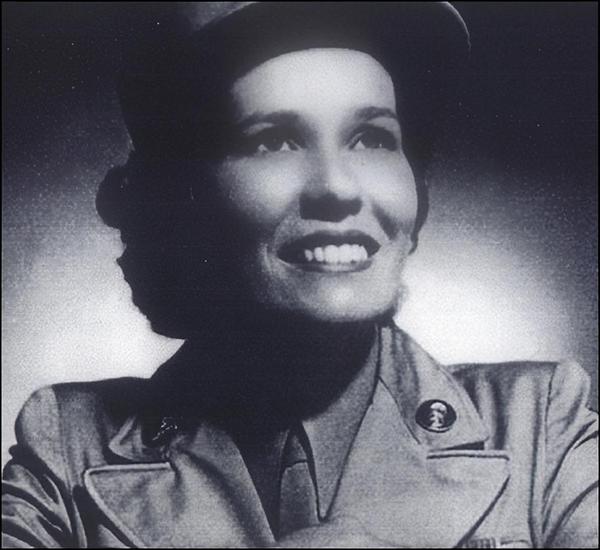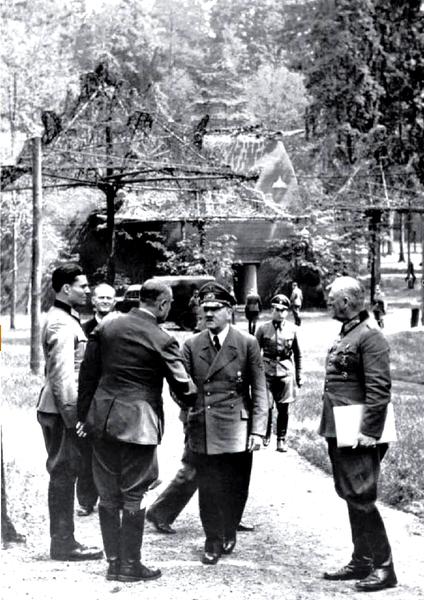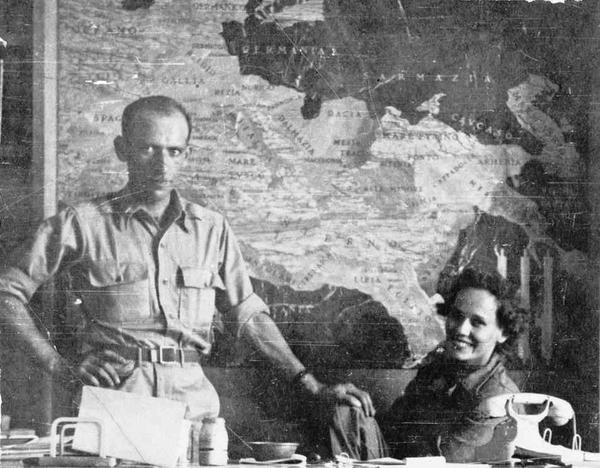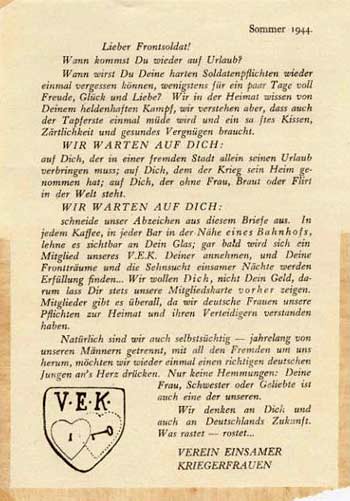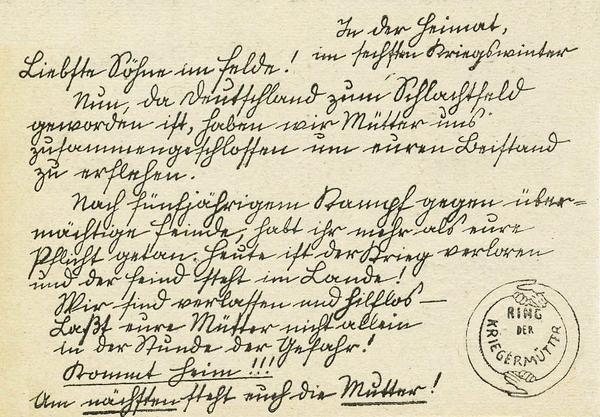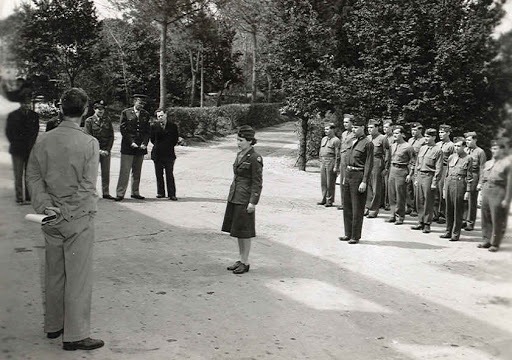April 12, 2024 Hello , The American psychological warfare team based in Italy during WWII included only one woman. Barbara Lauwers developed and produced propaganda aimed to crush the spirit of German soldiers so they would desert the Nazi
cause. She used love for their wives and mothers to do it. As you'll see, no method was too "shitty" to demoralize
the enemy. Over her two years with the Office of Strategic Services, OSS, a predecessor of the CIA, Barbara worked on numerous missions. One persuaded 600 Czechoslovakian soldiers who had been conscripted into the German army to cross enemy lines and surrender to Allied troops.
All's Fair in Love & War for WWII Black Ops Psych Agent
Corporal Barbara Lauwers's language skills were a huge asset to her US black ops, or psychological warfare, team. Born and raised in what was Czechoslovakia before WWII, she was fluent in English, German, Czech, Slovak and French. A spirited and ambitious young woman, she attended university, earned a law degree and worked as a lawyer. She had married an American and when Nazi Germany invaded and occupied parts of Czechoslovakia in 1939, the couple fled, eventually arriving in the US in 1941. After the bombing of Pearl Harbor, Barbara's husband joined the US army and in 1943, Barbara became an American citizen and enlisted in the Women’s Army Corps. “The truth was, I hoped the service would be a great adventure," she said, "and I did not want to miss it.”
Corporal Barbara Lauwers (Credit: US Army)
After basic training, the army appointed Barbara to the OSS.“Immediately we were put through intensive indoctrination—work and keep quiet about it, mind your own business and don’t ask questions," Barbara said, "be available 24 hours a day, seven days a week.”
She was first posted to Algiers, then Italy. Psychological warfare agents used a wide array of methods and activities to sow discontent and confusion among enemy soldiers. These included, but were not limited to,
bribery, blackmail, rumor mongering, writing poison-pen letters, forging misleading intelligence documents, falsifying of enemy documents, periodicals, and pamphlets. By the summer of 1944, Barbara had developed and carried out several propaganda campaigns when events in Nazi Germany provided a unique opportunity to strike at morale in the ranks of the German Army. On July 20, Count Claus von Stauffenberg and other disillusioned German military officers attempted to assassinate Hitler, planting a bomb beneath a table at a meeting attended by the Nazi leader. It appeared for several hours that Hitler may have been killed and the planned coup would be accomplished. The assassination
failed when the briefcase holding the bomb was inadvertently moved behind a large, heavy table leg which absorbed much of the blast. But it was latent moment for Allied provocateurs to shape hearts and minds. If propaganda could be quickly circulated.
Claus Von Stauffenberg, left, with Hitler (center) and Wilhelm Keitel, right, in an aborted
assassination attempt at Rastenburg on 15 July 1944
The Morale Operations team in Italy decided the usual method of dropping propaganda leaflets from an airplane wouldn't be effective and decided on a more
direct scheme, sending prisoners of war home to Germany to distribute false information. And so began Operation Sauerkraut! Being fluent in German, Barbara was selected interview men imprisoned in a camp at Aversa, near Naples. She and another OSS agent recruited sixteen men within 24 hours.
“When I was interviewing the prisoners," Barbara said later. "I was looking for dissidents who were willing to cross the front lines and distribute our propaganda.”
She created new identities for the prisoners and helped them memorize their stories. Four days later, disguised as German soldiers, even carrying firearms and ammunition, the dissidents sneaked 3,000 pieces of propaganda into German-occupied territory.
Barbara Lauwers and artist Saul Steinberg in Rome, 1944. (Credit:
US Army)
The dissident German POWs were instructed to causally scattered leaflets in the streets, nail them to trees and drop them in cafes, public buildings and gathering places. One missive was a forged military announcement that German General Albert Kesselring, whose job was to stop the Allied
advance from France into Germany, had resigned his command, The propaganda quoted Kesselring as saying that the "war is lost to Germany" and continued fighting will
result in senseless slaughter. This fake news made the rounds so successfully, three weeks later Kesselring found it necessary to issue a denial. Operation Sauerkraut
continued sending German POWs on propaganda missions through March 1945. One of the difficulties of being a black ops agent, was that there was rarely a way to measure
how successful your efforts have been. Also, many in other government branches and the military found the agents' deceptive methods offensive, repugnant and, well, stinky. OSS Morale Operations agents were a creative lot and included artists who drew graphics for various form of propaganda. Including toilet paper.
One of the OSS's trolls was to print toilet paper with Hitler's face on it - the Inscription says "use this side" and spread it across the latrines of enemy camps. US Army photo Another edition of TP read in German: “Comrades! Stop this shit! We do not fight for Germany but only for Hitler and Himmler. The NSDAP led us this damned way but now the bigwigs are only trying to save their own skin. They let us die in the mud; they want us to hold out until the last bullet. However, we need the last bullets to
free Germany from this SS shit. Enough! Peace!”
I don't know if Barbara Lauwers designed any of the toilet paper. But she was not above hitting enemy soldiers in their most sacrosanct domains. She established League of Lonely War Women campaign to convince German soldiers that
while they were away fighting, their wives and girlfriends were acting promiscuous or unfaithful to them. Barbara's fictitious league had its own symbol, two interlocking hearts. She wrote leaflets suggesting that soldiers on leave pin a paper heart on their lapel to attract a woman, lonely and tired of war, who would be happy to spend time with them. Two-hundred-thousand leaflets printed in German were distributed, supposedly to cause soldiers to doubt their own wives and girlfriends back home. A US reporter discovered one of the leaflets and The Washington Post reported: "German soldiers on leave from the Italian front have only to pin an entwined heart on
their lapel during furlough to find a girlfriend.”
League of Lonely Women pamphlet. Translation below in News & Links. Barbara's psychological warfare team also worked to demoralize German troops by insinuating their mothers wanted them to desert the army or surrender. Forged German Military Mail postcards appeared in Nazi-occupied regions supposedly written by women in the War Mother's Group. The front of the card
featured one of the primary aircraft of the Luftwaffe's fighter force. The flip side was stamped by the seal of the Ring der Kriegermutter (War mother’s group) and contained a fabricated handwritten message to a fictional soldier from his imaginary mother.
Translated message: At home, in the sixth winter of the war. Dear sons in the field! Now that Germany has
become a battlefield, we mothers have joined together to beg your help. After five years of struggle against overwhelming enemy power you have done more than your duty. Today, the war is lost and the enemy is within our country! We are abandoned and helpless – do not leave your mothers alone in the hour of danger! Come home!!! The mother is your nearest!”
The OSS
also conducted a major campaign of psychological warfare in the Pacific Theater of WWII against the Japanese. Did these schemes work to weaken the Axis powers? As I mentioned, in most cases it's difficult to know if any of the propaganda actually caused enemy soldiers
to desert their posts. But in at least one case, we know that they did. And Barbara Laurews won a Bronze Star for it.
Barbara's main duty while posted in Rome in 1943-44 was interrogating prisoners to gain intel that might aid in defeating the Nazis. Any little scrap of information might prove
important. One day, Barbara learned from a POW that along the Italian front, Czech and Slovak soldiers were assigned "dirty work" for the Germans. She believed she could use this information to influence men from her former country who'd been conscripted into the German army. First, she needed typewriters with the accents and characters
used in the Czech and Slovak languages. She found them at the Vatican, then typed up leaflets coaxing soldiers to change sides in the war. “Shed this German yoke of shame, cross over to the partisans,” she wrote. Barbara's pamphlets promised safe conduct for any troops deserting to the
Allies.
They were air-dropped, and the message also broadcast by the BBC. Within a week more than 600 Czech and Slovak surrendered, many with Barbara's leaflets in hand.
Barbara Lauwers receives her Bronze Star. US Army photo The Bronze Star is
awarded to members of the United States Armed Forces for either heroic achievement, heroic service, meritorious achievement, or meritorious service in a combat zone. Barbara's was presented to her on April 6, 1945, by the Morale Operations chief in Rome.
“I was told to put on my uniform and a little bit of lipstick and when we marched out, I was called to step forward,” she said. “Chills still run down my spine when I
think about it.”
After the war, Barbara enjoyed a stint broadcasting for the Voice of America, then moved to a job at the National Academy of Sciences in Washington. After some time, she took a job as a research analyst at the Library of Congress, staying for 20 years
before retiring in 1968. Then going for a visit to Austria, she ended up staying for nine years working for an international refugee organization in Vienna. Barbara's first
marriage didn't last. She married a second time in 1954 to Joseph Podoski and is remembered as Barbara Lauwers Podoski. Most of her work during WWII remained secret until 2008, when her OSS personnel records were declassified. She died the following year at age 95.
Like my article today? Please share:
Sources https://www.cia.gov/stories/story/glorious-amateurs-of-oss-sisterhood-of-spies/ https://www.cia.gov/stories/story/barbara-lauwers-deceiving-the-enemy/
Here's a translation of League of Lonely Women leaflet written in German by Women's Army Corp Corporal Barbara Lauwers while at work in the Rome office of the US Office of Strategic Services, Morale Operations. Summer 1944
Dear frontline soldier!
When will you have leave again?
When will you be able to forget your arduous soldier's duties for a while, for a few days of joy, happiness
and love? We at home know of your heroic struggle. We understand that even the bravest gets tired sometime and need a soft pillow, tenderness and healthy enjoyment.
WE ARE WAITING FOR YOU: For you who must spend your leave in a foreign town; for you whom the war
has deprived of a home; for you who is alone in the world without a wife, fiancée or a flirt.
WE ARE WAITING FOR YOU: Cut our symbol from this letter. In every coffee shop, in every bar near a railway station, place it on your glass so that it can be clearly seen.
A member of our VEK will soon contact you. The dreams you had at the front, and the longings of your lonely nights, will be fulfilled... We want you, not your money. Therefore, you should always show our membership card (to anyone who may approach you). There are members everywhere, because we women understand our duties to the homeland and to its defenders.
We are, of course, are selfish too - we have been separated from our men for many years. With all those foreigners around us, we would like once more to press a real German youth to our bosom. No inhibitions now: Your wife, sister, or lover is one of us as well.
We think of you and Germany's future. Which rests - rusts.
Association of Lonely War Women.
Follow me on social media
This newsletter is a reader-supported publication. To support my work, consider becoming a paid subscriber.
Read
a great book? Have a burning question? Let me know. If you know someone who might enjoy my newsletter or books, please forward this e-mail. I will never spam you or sell your email address, you can unsubscribe anytime at the link below. To find out more about my books, how I help students, teachers, librarians and writers visit my website at www.MaryCronkFarrell.com. Contact me at MaryCronkFarrell@gmail.com. Click here to subscribe to this newsletter. |
|
|

